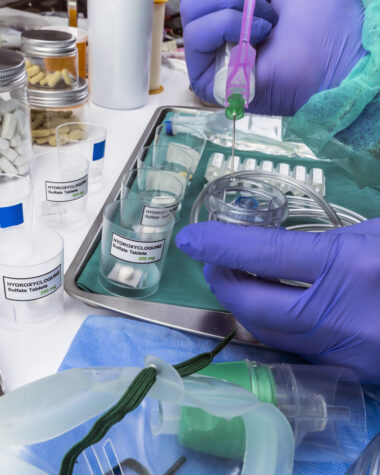Mersana Therapeutics (NASDAQ:MRSN) is a clinical-stage biopharmaceutical company shaped by a long-standing commitment to expanding what is possible in antibody-drug conjugate science and oncology drug development. Based in Cambridge, Massachusetts, the company has built its reputation on pioneering next-generation ADC platforms designed to address the limitations of earlier technologies and to offer new therapeutic solutions for cancers with few or no effective treatment options. From its earliest years, Mersana’s scientific vision centered on creating ADCs with improved stability, enhanced payload delivery, and optimized targeting, leading to the development of its proprietary Dolasynthen and Immunosynthen platforms. These platforms were engineered to generate highly controlled, reproducible ADCs capable of delivering potent cytotoxic or immune-stimulating agents more precisely to tumor cells. This technological foundation reflects Mersana’s belief that the next era of oncology therapeutics requires tools that can more effectively exploit tumor-associated antigens while improving safety and tolerability for patients.
As the company advanced its research, Mersana successfully assembled a pipeline of wholly owned and partnered ADC programs aimed at transforming care for patients with severe and underserved cancers. Among these programs is Emi-Le (emiltatug ledadotin; XMT-1660), a B7-H4-directed Dolasynthen ADC that represents one of the company’s most promising achievements. Initially developed with a focus on triple-negative breast cancer, particularly in patients who had already exhausted topoisomerase-1 inhibitor ADC options, Emi-Le was designed to address tumors expressing B7-H4, a clinically relevant antigen found across multiple solid tumors. Over time, Mersana expanded its therapeutic focus to include adenoid cystic carcinoma, recognizing the profound unmet need in this rare cancer and the potential for Emi-Le to deliver meaningful clinical benefit. Alongside Emi-Le, the company advanced XMT-2056, an Immunosynthen ADC targeting a novel epitope of HER2 aimed at activating targeted immune stimulation directly within the tumor microenvironment. These programs reflect the company’s evolution from a platform-centric innovator into a diversified developer of clinically meaningful cancer therapies.
The strength of Mersana’s scientific foundation and its disciplined approach to clinical development attracted increasing attention from strategic partners and the broader oncology community. This growing recognition culminated in the company entering into a definitive merger agreement with Day One Biopharmaceuticals in November 2025. The agreed-upon transaction, valued at up to approximately $285 million, includes $25.00 per share in upfront cash and up to $30.25 per share in contingent value rights tied to key clinical, regulatory, and commercial milestones. Day One’s interest in acquiring Mersana underscores the industry’s confidence in the potential of the company’s ADC platforms and pipeline, as well as the belief that these assets could be accelerated within a larger commercial-stage oncology organization. The acquisition also reflects Mersana’s longstanding mission to deliver new medicines to patients with life-threatening cancers and highlights how its scientific innovations have positioned the company for integration into a broader oncology portfolio.
Throughout its development, Mersana has complemented its scientific progress with a thoughtful corporate strategy supported by experienced leadership, strong partnerships, and a commitment to advancing therapies for patients who need them most. Its board of directors unanimously approved the acquisition, recognizing that the combination of Mersana’s ADC assets with Day One’s commercial and developmental capabilities could ultimately bring novel treatments to patients more efficiently and effectively. With support agreements from key shareholders and experienced advisors guiding the transaction, Mersana’s history now transitions into a new chapter in which its innovations stand to benefit from expanded resources and continued investment. Its background as a company rooted in ADC innovation, scientific rigor, and patient-centered development remains central to its identity, even as it moves forward under the Day One Biopharmaceuticals umbrella.
Mersana Therapeutics’ Transformation Into a Next-Generation ADC Innovator
Mersana Therapeutics, Inc. emerged as one of the most innovative clinical-stage biopharmaceutical companies in the oncology landscape, building its identity around the development of next-generation antibody-drug conjugates capable of addressing cancers with the highest unmet medical need. Founded in Cambridge, Massachusetts, Mersana’s background is deeply rooted in the belief that ADC technology can be radically improved using refined chemistry, more stable linkers, immune-modulating payloads, and precision targeting that earlier ADC generations could not achieve. Over the years, the company invested heavily in scientific engineering, creating two flagship proprietary ADC platforms—Dolasynthen and Immunosynthen—that serve as the backbone of its clinical pipeline. These platforms were designed to deliver cytotoxic and immunostimulatory payloads with exceptional stability, consistent drug-to-antibody ratios, and optimized pharmacokinetics, allowing Mersana to push the boundaries of what ADCs can accomplish in solid tumor oncology.

CHECK THIS OUT: Corcept (CORT) Skyrockets 1,534% in 10 Years and Immuneering (IMRX) Reports 86% 9-Month Survival in Pancreatic Cancer.
A Scientific Foundation Built on Dolasynthen and Immunosynthen ADC Platforms
The company’s reputation grew as it expanded both the cytotoxic Dolasynthen platform and the immune-activating Immunosynthen platform, enabling the creation of advanced ADCs that target cancer cells with improved potency, precision, and tolerability. These platforms are central to Mersana’s background and helped establish the company as a pioneer in next-generation ADC design. Dolasynthen, in particular, became widely recognized for its ability to produce homogenous ADCs with highly controlled pharmacological properties, while Immunosynthen introduced a breakthrough concept: using ADCs to deliver STING-agonist immune activation directly into tumors, boosting anti-tumor immunity without systemic toxicity. This scientific evolution supported the development of Mersana’s key clinical programs, including Emi-Le (emiltatug ledadotin; XMT-1660), a B7-H4-directed Dolasynthen ADC, and XMT-2056, an Immunosynthen ADC targeting a novel HER2 epitope. These programs showcase the company’s mission-driven approach to creating therapies for populations lacking effective treatment options.
Expansion Into High-Need Cancers With Emi-Le and a Broad Therapeutic Vision
As its ADC platforms matured, Mersana focused its development pipeline on aggressive and treatment-resistant cancers. Emi-Le emerged as the company’s lead asset, originally developed to treat triple-negative breast cancer (TNBC) in patients who had previously been treated with topoisomerase-1 inhibitor ADCs. This group had extremely limited therapeutic alternatives, making B7-H4 an ideal target for Mersana’s high-precision Dolasynthen platform. As clinical and biological insights advanced, Mersana identified a second high-need population: patients with adenoid cystic carcinoma, a rare cancer with almost no meaningful therapeutic progress in decades. This strategic expansion aligned with the company’s history of prioritizing cancers where patients have the least access to effective therapies. The incorporation of Emi-Le and XMT-2056 into Mersana’s pipeline cemented the company’s identity as a developer of purpose-built ADCs designed for unique tumor biology and underserved oncology segments.
Strategic Validation Through a Major Acquisition by Day One Biopharmaceuticals
Mersana’s scientific accomplishments and carefully constructed ADC platforms attracted strong interest from industry partners, eventually leading to a pivotal moment in the company’s history: a definitive merger agreement with Day One Biopharmaceuticals announced on November 13, 2025. Under the agreement, Day One would acquire Mersana for $25.00 per share in upfront cash and up to $30.25 per share in contingent value rights tied to key clinical development, regulatory approvals, and commercial milestones related to Emi-Le and an existing collaboration. The acquisition represents an equity value of approximately $129 million at closing and a total transaction value potentially reaching approximately $285 million. The Board of Directors of Mersana unanimously recommended that stockholders tender their shares, demonstrating unified support for the merger and its strategic significance. This transaction signals strong external validation of Mersana’s platforms and their long-term commercial and clinical potential.
Corporate Governance, Shareholder Support, and Transition Into a New Development Era
Mersana’s background is also defined by disciplined governance and strong institutional support. The company’s leadership, including its executive officers, directors, and major stockholders affiliated with Bain Capital Life Sciences—collectively representing approximately 8.5% of outstanding shares—signed tender and support agreements backing the acquisition. The tender offer is structured to be launched within 10 business days of November 12, 2025, followed by a second-step merger for any shares not tendered. Upon closing, Mersana will become a wholly owned subsidiary of Day One Biopharmaceuticals, and its stock will no longer trade publicly. This transition reflects the culmination of years of research, platform engineering, and strategic development aimed at elevating next-generation ADCs to the forefront of cancer therapy.
A Mission Driven by Patient Need, Scientific Precision, and Next-Generation Oncology Innovation
Throughout its evolution, Mersana remained dedicated to the principle that patients are waiting for better treatment options, and that innovative ADC science can fundamentally reshape therapeutic possibilities. The company built an advanced pipeline powered by refined chemistry, rigorous research, and strategic collaborations across the biotech and oncology ecosystem. Its commitment to developing novel ADCs with the potential to treat a wide range of cancers—particularly those with little or no viable standard of care—remains the essence of its identity. With Day One Biopharmaceuticals set to integrate Mersana’s platforms into its expanding oncology portfolio, the company enters a new chapter defined by broader development capabilities, expanded resources, and the shared goal of accelerating next-generation cancer therapies for patients of all ages.
READ ALSO: Tiziana (TLSA) Surges 143% in 2025 and Immuneering (IMRX) Reports 86% 9-Month Survival in Pancreatic Cancer.








